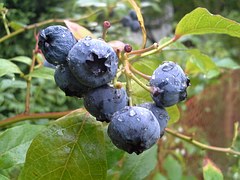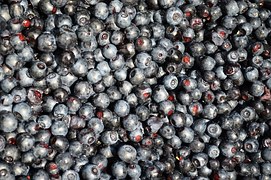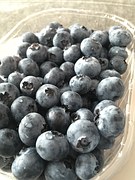 Bilberry is a tasty little herb that is high in antioxidants. It is known to be helpful in a ton of problems and you may be wondering about bilberry for macular degeneration.
Bilberry is a tasty little herb that is high in antioxidants. It is known to be helpful in a ton of problems and you may be wondering about bilberry for macular degeneration.
In this article you’ll see different studies and expert opinions that prove their effectiveness with this problem. Also you’ll learn about different ways to take bilberry, dosages and any safety concerns.
Before that let’s look at some important information.
Background Information
Botanical name: Vaccinium myrtillus
Common Names: European blueberry, bogberry, whortleberry
Parts Used: Fruits
What Is Macular Degeneration?
Macular degeneration is the leading cause of blindness in people over 50. The macula is the central and most sensitive portion of the retina, the nerve rich area in the back of the eye that is necessary for sight; it’s especially important for what’s right in front of you and fine detail.
For some unknown reason at the age of 60 the macula starts to break down and eye site deteriorates.
According to the National Eye Institute the following people are at a high risk for this condition:
- Smokers
- Caucasians
- Family history and genetics are a big factor. Scientists have found 20 genes that can play a role in macular degeneration.
Also, people who are farsighted and have a light eye color are at greater risk.
So, Can Bilberry Fight Macular Degeneration?
It can! Bilberry is probably the best natural remedy for this problem. These berries are high in antioxidants which help preserve your eye site. Many people believe that cell damage caused by highly reactive oxygen molecules (free radicals) play a role in macular degeneration. Antioxidants neutralize free radicals and prevent them from doing harm.
The antioxidant found in bilberries is called anthocyanosides and is why it is so helpful.
In one European study, 31 people with all kinds of retina problems, including macular degeneration, were given a bilberry extract and every participant experienced significant improvement.
In another study, patients who received a daily treatment of 400 milligrams of bilberry extract and 20 milligrams of beta-carotene improved night vision and field of vision.
In a third study, 10 men and women between 61 and 77 with macular degeneration volunteered for a South Dakota researcher. They were given fruits and vegetables high in antioxidants. supplements containing many antioxidants. and extracts of bilberry and ginkgo. After a year, all 10 men and women showed great improvement in their vision.
So now that you know bilberry is very effective in this condition, you should know how to take it and safety concerns.
How To Take, Dosages, And Side Effects
There are a few ways to take bilberry. First off, you can just eat the berries in a variety of ways. This includes:
Eat a healthy amount, regularly for preventative purposes. An extract is what is usually recommended once the condition has started. You’ll want to take anywhere between 80 to 400 milligram of a standardized bilberry extract up to 3 times a day.
Another great way to get bilberry’s eye-promoting benefits is with an infusion or tea. Herbal pharmacologist Daniel Mowrey, PH.D., and author of Herbal Tonic Therapies suggests a combination of bilberry, butcher’s broom, centella and ginger. Use plenty of bilberry and whatever combo of the other herbs you have and steep in boiling water for 15 minutes; you can drink up to 4 cups a day.
As for side effects, there really aren’t any. You should let your doctor know if you plan on using medicinal amounts.
Other Hints To Aid In Treatment
It’s a lot cheaper and easier to prevent problems than to cure them. So if you haven’t developed macular degeneration and wish to prevent it, make sure to eat lots of antioxidants. Common sources of antioxidants are dark colored berries and fruits. These include:
- Blueberries
- Blackberries
- Raspberries
- Cherries
- Cranberries
- Grapes
- Plums
- Raisins
- Prunes
Leafy vegetables are high in them too.
According to world renowned herbalist James A. Duke PH.D., the following herbs are excellent remedies for macular degeneration:
- Collar Greens
- Spinach
- Various vegetables (bok choy, broccoli, brussels sprouts, cabbage, kale, kohlrabi, mustard greens, radishes, turnip greens, and watercress)
- Ginkgo (mentioned in one of the studies before)
- Peanuts and soybeans
- Clove
- Wolfberry
According to a study done by ophthalmologist Johanna Seddon, M.D., taking vitamin C and E supplements, both powerful antioxidants, were NOT useful. You should get your antioxidants from whole, rich nutrient foods and herbs. Not from single nutrient supplements.
Shepard’s purse is another herb with antioxidants and vitamin C.
According to Andrew Weil M.D., the following lifestyle changes are a must in this condition:
- Avoid smoke and secondhand smoke
- Where sunglasses with UV protection
- Minimize saturated fats and increase antioxidants
There’s plenty you can do to prevent/improve this problems.
There Is Plenty Of Hope With Macular Degeneration
I hope you feel good about preventing and treating this issue, especially with bilberry. It is an excellent fruit that has so much medicinal value. Helping your eyes is only one of the benefits.
If you are looking to purchase this herb I’d like to suggest Starwest Botanicals. They are my favorite supplier of herbs and they have never let me down.
Learn More About Starwest Botanicals
They have many bilberry options, but for some reason don’t have bilberry extract. I did a little research and found a really great extract here.
If you have any questions comment below and I’ll respond as fast as possible. Also, share on social media for friends and family to see.
Thanks for reading!




I found this really interesting! I had never even hear of a bilberry, much less that it could be so helpful to the human body. They look a lot like blueberries in the picture. I’m wondering how similar the two berries are nutritionally? I could easily get my hands on blueberries and I love eating them anyway.
Billberry and blueberries are very similar; they belong in the same family. Blueberries are really good for you too and full of antioxidants.
Pingback: Where To Buy Bilberry Tea – A Rich Source Of Antioxidants - Perfect Health At Home
Hi Dylan, thanks for your great post. When my dad was diagnosed with burnt out retinopathy, he was also advised by one of his doctors to take bilberry extract vitamins. It also helped to regulate his blood sugar levels since he was also diabetic and his burnt out retinopathy was a result of his diabetes.